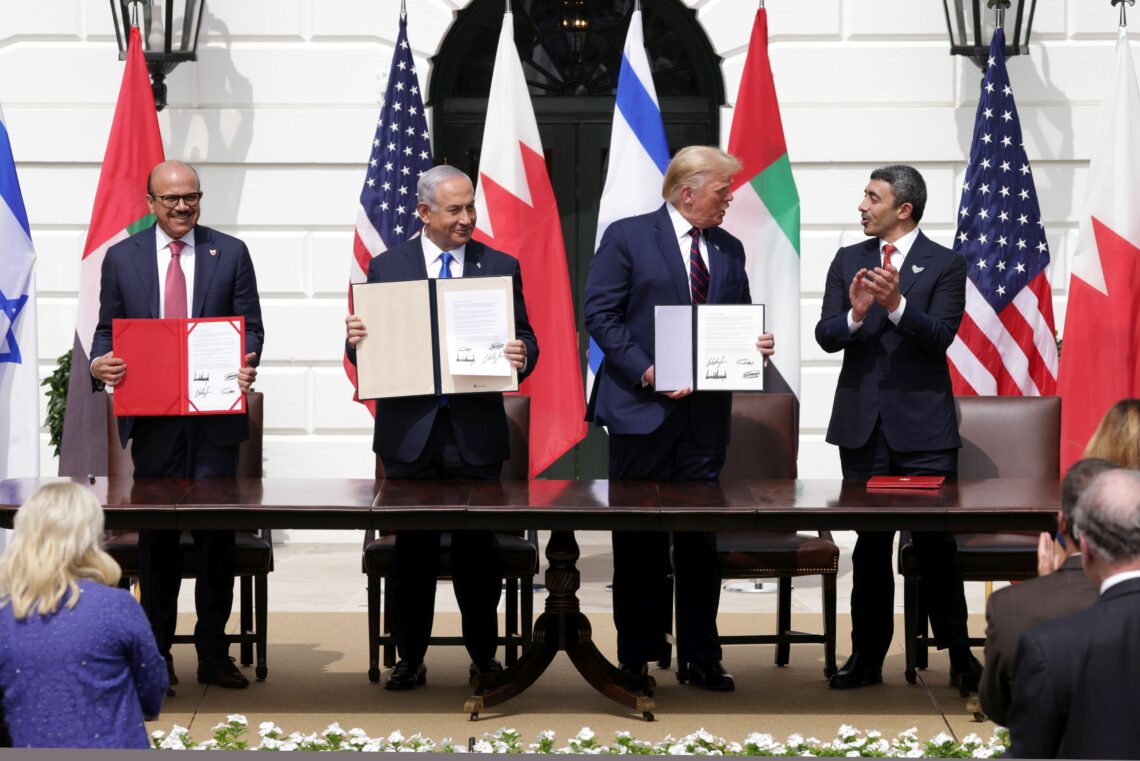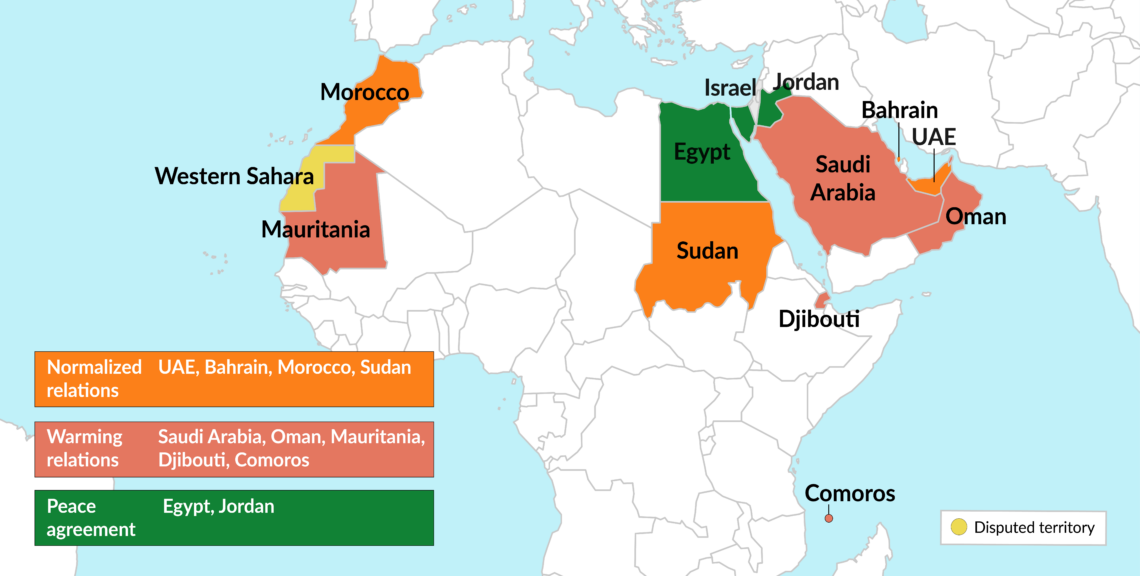Cautious optimism in the Middle East
As 2021 begins, there is room for hope in the Middle East as the ongoing normalization process between Arab states and Israel holds the potential to usher in a new era of peace. Yet there are plenty of actors who would benefit from further chaos and violence in the region.

In a nutshell
- Economies in the Middle East region look set to rebound
- The Abraham Accords should boost trade and stability
- The future hinges on the moves of the new U.S. administration
This GIS 2021 Outlook series focuses on the opportunities that stem from the upheaval of the past year.
In 2020, as Covid-19 ravaged the Middle East, other momentous events in the region took the world by surprise. Several Arab states decided to normalize their relations with Israel, ushering a new era of economic and scientific cooperation in a widening arc of peace. These developments could provide the impetus for a swift recovery, now that the fight against Covid-19 is entering a decisive phase.
On the other hand, external influences and destructive forces rooted in nationalist and militant religious ideologies still threaten the stability and the prosperity of the Middle East. The new administration in Washington will have a decisive impact on how the future plays out. Will President Joe Biden, who has stated that he approved of the peace deals known as Abraham Accords, pursue and expand the ongoing process of normalization or focus on a return to a nuclear deal with Iran – and if so, under which conditions?
Economic revival
After a disastrous 2020 that saw a general economic downturn, renewed growth could return to the region by the second half of 2021. For example, the Institute of Chartered Accountants in England and Wales (ICAEW) estimates that the Middle East’s overall economy shrank by 6.8 percent in 2020, but will grow by 2.9 percent for 2021 – even stronger than the average growth of 2.6 percent recorded between 2010 and 2019.
In mid-2020, states in the Middle East were still hoping that oil and gas prices would soon return to their 2019 levels and that international trade and tourism, the mainstay of their economies, would follow suit. Major oil producers such as Saudi Arabia and the United Arab Emirates (UAE) believed that their foreign currency reserves would ensure that they would weather the storm. They were proven wrong on both counts. However, predictions of popular uprisings driven by worsening economic conditions, potentially leading to severe upheaval, did not come to fruition.
Economic activity will drive the need for more energy, pushing up oil and gas prices.
Now, as the first waves of vaccination begin throughout the Middle East and around the world, optimism prevails. Multinational companies are already at work rewriting their estimates. Foreign investment is set to return to the region.
Renewed economic activity will drive the need for more energy, pushing up oil and gas prices. That will enable countries in the Middle East to cover their budget deficits and move forward with development projects aimed at diversifying their economies and reducing their dependence on petroleum. It will not be all smooth sailing, however.
In November, news that several vaccines were imminent buoyed global markets. Oil companies’ stock prices rose, and the price of Brent crude increased by 10 percent. It did not last. Oil prices had already been sagging before the onset of the pandemic due to wider use of environmentally friendly sources of energy and a glut on global markets. Those factors remain in place.
As the peace talks in Libya have progressed, the country is again exporting oil, and it hopes soon to reach a million barrels per day. If the Biden administration ends sanctions on Iran, its crude exports could reach 3 million barrels a day. In expectation of that move, Tehran has already instructed its companies to begin restoring their production and export capabilities.
Not all OPEC members have held to the organization’s agreement to maintain price levels by reducing exports. Gulf countries need prices to reach $70 to $80 a barrel – against $45 to $55 as of late January 2021 – something most analysts consider unrealistic in the near term. Nevertheless, one can expect that the rollout of vaccines will engender optimism, driving prices upward.
Increasing trade
The expected boost in international trade will help countries that have stable central governments, but it will bypass Syria and Yemen, as well as Hezbollah-dominated Lebanon, which is in the throes of an economic and political crisis. Along the Mediterranean and the Red Sea, the UAE, Somalia, Djibouti and Israel, which have all recently invested in port development, will be prime beneficiaries. Many of these ports are operated by Emirati firm DP World, a major player in China’s enormous Belt and Road Initiative. Chinese influence in the region may deepen.
Israel, the UAE and a local company are bidding for the acquisition of the port of Haifa. A projected pipeline would bring Emirati oil from the Red Sea city of Eilat to the Mediterranean port of Ashkelon for delivery to Europe, cutting time and costs and eliminating the need to deliver it by ship through the Suez Canal. Three major projects have been proposed: the East-Med gas pipeline, the Red Sea-Dead Sea Conveyance canal and a railway connecting the port of Haifa and Abu Dhabi via Jordan and Saudi Arabia. If implemented, they will enhance regional cooperation and transform the region’s economy.
Facts & figures

Egypt, for which 2020 growth is still projected at a surprising 3.6 percent, will see more traffic through the Suez Canal and at its ports of Suez, Port Said and Alexandria. In the past, it enjoyed remittances from its six million citizens working in the Gulf states and three million in Europe, accounting for 11 percent of its gross domestic product (GDP). These fell steeply during the crisis and recovery will depend on higher oil prices and general economic growth in Europe. Tourism, another source of revenue for many Arab states, will have to wait for an end to international air travel restrictions, probably not before the second half of 2021, but is then expected to recover quickly.
Meanwhile, there is an unexpected boom in the economies of the Gulf states and Israel following the signing of the normalization process. Daily flights between these countries are frequently full, and there is a stream of delegations from public and private institutions with deals being struck daily. Israeli tourists flock to Dubai and Abu Dhabi, where hotels now provide kosher meals. Israeli exports to the UAE are expected to top $1.5 dollars with overall trade figures between the two estimated to reach five billion dollars in a matter of years.
Normalization process
So far four countries have agreed to normalize their relations with Israel: the UAE, Bahrain, Sudan and Morocco. Oman, Mauritania, Djibouti and Comoros are expected to follow suit. Saudi Arabia, which supports the agreements, is still hesitating. In 2012 it sponsored the so-called Arab peace initiative, based on the creation of an independent Palestinian state alongside Israel, an initiative favored by King Salman. His son, Crown Prince Mohammed bin Salman, is still trying to persuade him to normalize his country’s relations with Israel.
There are also talks of Indonesia, the most populous Muslim country, making public the very discreet relations it has had with Israel for years.
Mr. Trump persuaded Morocco to normalize its relations with Israel by recognizing its sovereignty over Western Sahara.
These developments still need to be nurtured. President Trump worked hard to ensure their success as his tenure wound down. On December 14, Sudan was taken off the U.S. list of state sponsors of terrorism. It will now be able to obtain loans from international financial institutions and ask for a reduction of its formidable external debt.
Mr. Trump persuaded Morocco to normalize its relations with Israel by recognizing its sovereignty over Western Sahara. Israel and Morocco have maintained close cooperation since the late 1950s. An Israeli-American delegation flew to Rabat on December 22, 2020 to discuss the agreement of the normalization process; cooperation agreements on water, investment and air transport were signed during their short visit. Liaison offices in both countries are due to open shortly.
In Lebanon, Hezbollah has so far blocked efforts to demarcate the country’s maritime border with Israel. However, since determining the border is necessary for Lebanon to start exploring and exploiting its underwater oil fields, negotiations will no doubt start again under the auspices of the Biden administration. Its international trade will remain hampered due to damage at the port of Beirut caused by the August 2020 explosion. Prior to the disaster, the port had undergone extensive renovations and was set to benefit from renewed economic activity.
Under President Trump, the U.S. State Department approved the sale of advanced military equipment, including F-35 fighter planes and sophisticated drones, to the UAE to help it defend itself against Iran. Not only is the deal in Washington’s interest because it helps keep Tehran in check, it also is worth billions of dollars to U.S. businesses.
Potential dangers
However, there are other forces at work. World powers like Russia, and regional ones like Iran and Turkey, are involved in ongoing civil wars in Syria, Yemen and Libya. They are wary of the normalization process between Arab states and Israel, fearing it will diminish their influence in the region. Turkey opposes the normalization process because it supports the Muslim Brotherhood and the Palestinian cause. Iran does too. Beyond its well-known stance that Israel has no right to exist, Tehran also sees the alliance between Israel and Gulf states as a threat.
Iran and Turkey will continue trying to destabilize the region and hamper economic progress.
These countries will continue trying to destabilize the region and hamper economic progress. Of the two, Iran is the most dangerous. Much will depend on how President Biden addresses the issue. In an interview with the New York Times on December 2, 2020, he stated that rejoining the Iran nuclear agreement (the Joint Comprehensive Plan of Action, JCPOA) was the best way to restore stability to the Middle East. He intends, however, to extend and tighten the limitations on Tehran’s nuclear program, address the missiles issue and keep the option of reinstating all or part of the sanctions.
Scenarios
The Ayatollahs will not fold easily. Negotiations will be difficult and protracted. Iran is mustering its formidable diplomatic and propaganda capabilities and pushing on with its nuclear program. President Hassan Rouhani, touted in the West as a moderate, admonished President Biden not to follow President Trump’s example, telling him to do away with the sanctions and return to the JCPOA. Meanwhile, Tehran continues to breach the treaty. Three new state-of-the-art centrifuges will be added to the Natanz uranium enrichment plant, in violation of Iran’s obligations. Aerial pictures show that the plant, damaged by a mysterious explosion, is being transferred to a new underground site.
The Iranian parliament has adopted a law calling for an expansion of the nuclear program and forbidding the International Atomic Energy Agency from inspecting its nuclear sites if Europe does not ease sanctions on oil and gas exports. So far, Iranian Supreme Leader Ayatollah Ali Khamenei has not signed the legislation, content to have it at his disposal as a threat. Both the Ayatollah and President Rouhani have declared that Iran’s missile program is nonnegotiable. According to Rafael Grossi, director general of the IAEA, if the Biden administration were to revive the nuclear deal, it would require a new agreement, since Iran’s violations have significantly altered the situation.
Israel has voiced its strong opposition to any compromise that would allow Iran to pursue its nuclear program through uranium enrichment, establishing new centrifuges and maintaining nuclear sites. Such activity would put Tehran in a position to build a nuclear weapon almost as soon as the JCPOA ends. If the new administration helps the ongoing normalization process grow, bringing in more Arab states, it would not only be a powerful deterrent for Iran but also offer new hope to the region.
While the fate of the Middle East hangs in the balance, it should be remembered that in December 2019, few predicted that a new virus in China was about to become a global pandemic, or that the Abraham Accords would be signed, potentially ushering in a new era of peace.








